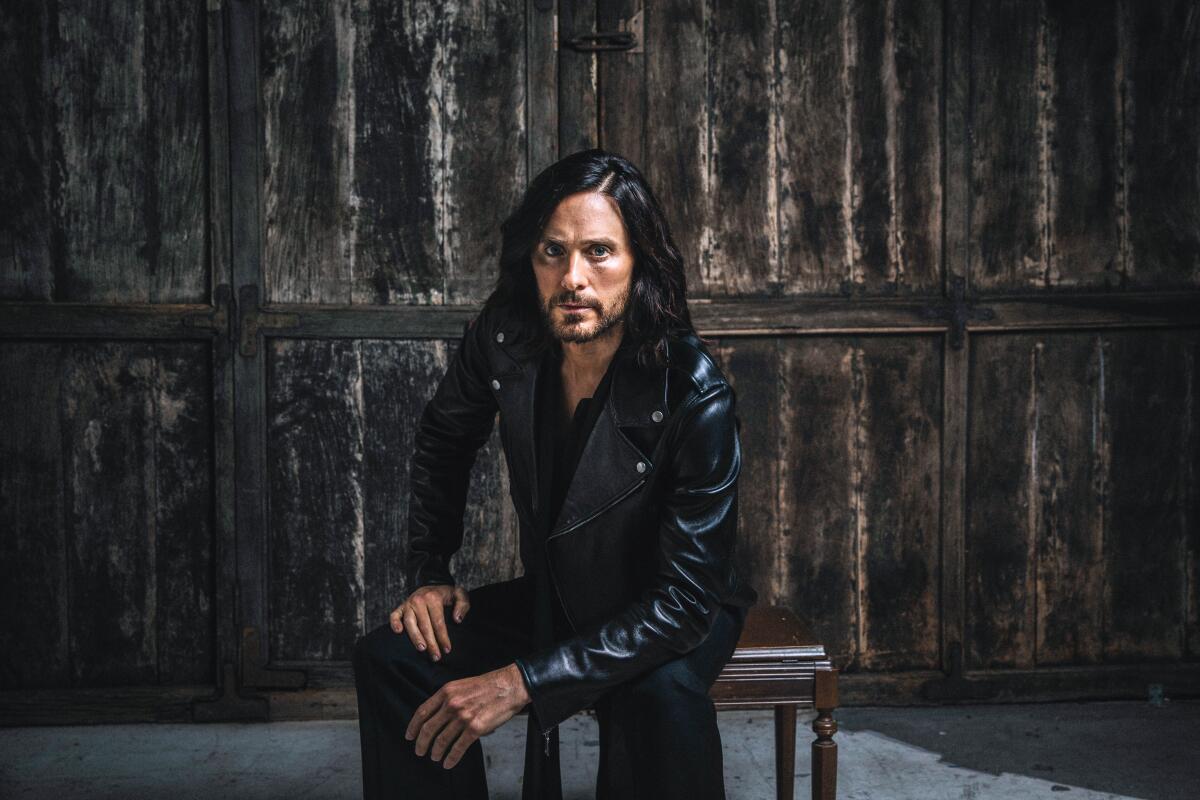How Jared Leto almost gave Al Pacino a heart attack. Boof!

- Share via
What Jared Leto learned about Ridley Scott’s “House of Gucci” when he first heard about it was that it told a true story about the scandal-ridden, betrayal-happy family behind the legendary fashion brand. He was also informed that his name wasn’t in the mix. That changed when the Oscar-winning actor finally got hold of the script and was inescapably drawn to designer Paolo Gucci, dismissed by the entire Gucci clan as a talentless buffoon.
“I was just spellbound by him,” says Leto, who immediately got Scott on the phone, and by the time they’d hung up, had the part and a promise from the British filmmaker to give the actor, famous for his deep-dive creative process, wide berth. “I said, ‘I need your permission to go absolutely f— crazy,’” Leto recalls telling Scott. “He started laughing and said, ‘Let’s do it.’ I don’t know what they expected, but they definitely weren’t expecting the journey we went on.”
What was it about Paolo that captured your imagination?
Paolo was unique. Usually, the family is the one encouraging you, patting you on the back. But he was constantly marginalized, never allowed to have a voice. It was easy to relate to him. When we look at careers, we usually see the peaks but forget about the valleys. I’ve had plenty of those. There was also this beautiful sense of humor. I had different ad libs for every take, and improvisations, both physical and dialogue. The list was a mile long. I just decided on this [film,] I wasn’t going to ask [to go off script]. They were just going to have to tell me to shut up.
Share your thoughts on improvisation.
The thing about improvisation, which I do a lot of, is that it not only surprises others, it surprises you. If I start talking right now to you about Andy Warhol or pumpkin pie, it pushes us to a place oftentimes where it can break things for a moment. But it also compels us into that sacred moment where the truth is alive. That’s what I love about it. When you’re that wild card, you tend to stay committed, focused and “in character,” that cliché term that people like to use. It can help to create that sense of identity.
How does this work during rehearsal?
I didn’t do any rehearsal. Not a single scene. I love to work that way. Ridley works that way too. I love it to be a wreck, to be nasty, to be broken. If it’s up to me, I love to shoot it right away. I know it drove Al [Pacino, who plays Paolo’s father] crazy. I heard from afar, Al making a couple comments about rehearsal. But I didn’t really get what he was talking about until the end. I was like, “Oh! He wants time to just get it on its feet and run through it.” That makes sense.
Your most quoted line in “Gucci” is “Boof!” What does it mean?
A lot of different things: A punctuation mark. An expression of resignation or frustration. I probably said it a hundred thousand times more than is actually in the movie. It’s a characteristic. Like a mole on his face. We actually made a [boof!] T-shirt as a wrap gift. Everybody loved it.
The garish suits, thinning hair, high-pitched voice and full-on prosthetics. Is it true that you kept what you were doing with Paolo a secret?
I didn’t want to meet anyone [beforehand]. I find that really exciting.
It has been said that Pacino initially didn’t recognize you.
I showed up on set the first day and went up to Al Pacino and said, [Italian accented voice] “Papà!” And he just kind of brushed me off and shuffled away. I was like, “Maybe he’s playing the cold, distant father.” A few minutes later, I went up again and said, [quietly] “Papà!” And again, he was like, “Yeah, yeah.” Then someone whispered to him, “It’s Jared.” I think he clutched his heart. He almost fell on the floor. And he said, [warmly] “My son.” He was just a beautiful partner. So generous, no ego.
Talk about remaining as Paolo, even between takes.
I don’t know how else to do it. If someone else can be on their cellphone scrolling through TikTok before their scene? Beautiful. I can’t do that. I enjoy the immersive process. I think it’s exciting.
Lately, immersive acting has come under scrutiny. Why do you think that is?
I think it’s misunderstood, complicated by rumor, a kind of tabloid interpretation. For me, it’s not egocentric or driven by hubris. It’s a very practical, scientific way of working. When I play a real person I feel obligated to represent them in the best, most honest way I can and with as much dignity and grace to represent their life, both inside and out.
Another way to describe it is, “Oh, he’s just working really hard.” Everyone has their own technique, methodology. I have mine. But I’m not apologizing for it anymore. For a long time, I wouldn’t even talk about it. But now it’s OK. Not everyone has to understand everything.
More to Read
From the Oscars to the Emmys.
Get the Envelope newsletter for exclusive awards season coverage, behind-the-scenes stories from the Envelope podcast and columnist Glenn Whipp’s must-read analysis.
You may occasionally receive promotional content from the Los Angeles Times.










